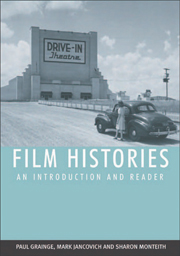Book contents
- Frontmatter
- Contents
- Preface
- Part I Film History from its Origins to 1945
- 1 The Emergence of Cinema
- 2 Organising Early Film Audiences
- 3 Nationalism, Trade and Market Domination
- 4 Establishing Classical Norms
- 5 The Age of the Dream Palace and the Rise of the Star System
- 6 Competing with Hollywood: National Film Industries outside Hollywood
- 7 The Rise of the Studios and the Coming of Sound
- 8 Realism, Nationalism and ‘Film Culture’
- 9 Adjustment, Depression and Regulation
- 10 Totalitarianism, Dictatorship and Propaganda
- 11 The Common People, Historical Drama and Preparations for War
- 12 Wartime, Unity and Alienation
- Part II Film History from 1946 to the Present
- Bibliography
- Copyright Acknowledgements
- Index
11 - The Common People, Historical Drama and Preparations for War
from Part I - Film History from its Origins to 1945
Published online by Cambridge University Press: 05 August 2013
- Frontmatter
- Contents
- Preface
- Part I Film History from its Origins to 1945
- 1 The Emergence of Cinema
- 2 Organising Early Film Audiences
- 3 Nationalism, Trade and Market Domination
- 4 Establishing Classical Norms
- 5 The Age of the Dream Palace and the Rise of the Star System
- 6 Competing with Hollywood: National Film Industries outside Hollywood
- 7 The Rise of the Studios and the Coming of Sound
- 8 Realism, Nationalism and ‘Film Culture’
- 9 Adjustment, Depression and Regulation
- 10 Totalitarianism, Dictatorship and Propaganda
- 11 The Common People, Historical Drama and Preparations for War
- 12 Wartime, Unity and Alienation
- Part II Film History from 1946 to the Present
- Bibliography
- Copyright Acknowledgements
- Index
Summary
It was not only the film industries associated with totalitarian governments that turned to historical subject matter in the 1930s, and nor was the concern with the common people simply a feature of socialist filmmaking. On the contrary, these preoccupations were also evident in the United States, the United Kingdom and France in the late 1930s as they responded to both the Depression and the growing threat of fascism.
Although the Depression did not really come to an end until the United States entered the war in 1941, the film industry fared better after 1935. Most of the studios had suffered economically during the early 1930s but, by the mid-1930s, they had restructured themselves in response. Also, economic confidence was improving and consumer spending on leisure activities such as cinemagoing was on the increase. The Depression, though, was still a significant issue and Hollywood responded in two apparently contradictory ways. On the one hand, the pressing social problems required that Hollywood display a sense of social responsibility and produce films that tackled the harsh realities of the period. On the other, Hollywood also claimed to offer the exact opposite: a pleasurable escape from these harsh realities.
- Type
- Chapter
- Information
- Film HistoriesAn Introduction and Reader, pp. 236 - 255Publisher: Edinburgh University PressPrint publication year: 2007



